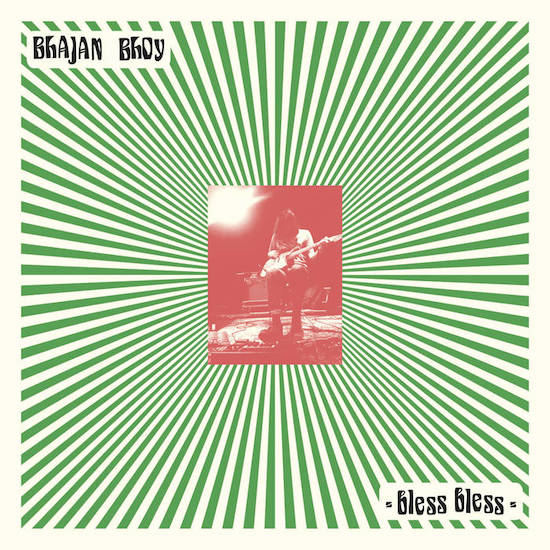Ajay Saggar has always been a busy man. Bassist in Peel faves Dandelion Adventure, once of Donkey, and now one of the soundmen at Paradiso, Saggar is also the guiding force behind a plethora of Dutch-based bands such as The Bent Moustache, King Champion Sounds and Deutsche Ashram. A born collaborator and connector then, and I dread to think how many other acts Saggar has been part of over the years. But somehow he has struck gold with Bless Bless, his first proper solo release, (though in true Ajay Saggar fashion, there are some guest vocals). It’s funny how life can turn on you and turn you into or onto, something else. At times this album disappears to places that I wouldn’t associate with the artist I thought I knew.
2020 has already been a fine year for Dutch alternative albums. The Homesick, Lewsberg, Hunter Complex, Zea, It Dokkumer Lokaelstje and Combo Qazam have all released fascinating and very different-sounding records in this first quarter, all showing that the Netherlands is not just a bastion for modern guitar pop. This is definitely another to add to the pile.
But despite this being to all intents and purposes a Dutch release from deep in De Zaanstreek, Bless Bless often reminds me of the East Lancashire moors, specifically those huge, shifting and often spooky expanses that frame compact post-industrial towns such as Nelson, Rossendale or Ramsbottom. You almost expect Martin Hannett to grumpily wander over and start sampling the throaty drone of ‘Stuck in a Barrel’, whilst ‘Polar Wind’ – a great loop of chiming guitar and bleeping synth – could be a John Virtue canvas from the days he was an Accrington postman, or an aural pathway that leads to the Singing Ringing Tree on the moors above Burnley.
Something very personal in the recording process – maybe the simple fact of recording alone – has allowed these apparently weightless tracks to, conversely, be anchors; thrown down into the wells of Saggar’s memory. You begin to feel he is trying very hard to express half-remembered flashes or snatches from his past and trying to turn them into sound. And maybe that is why Bless Bless also has the quality of being a very cinematic record. The obdurate synths in ‘Magicho’ or the weird voices that float in and out of ‘Blessed House of Wahovia’ put me in mind of more film scores or incidental music; Bruce Lacey or the more abstruse elements of Korzyński; or Will Sergeant’s Villa Luonge soundtrack for instance. All music that invokes another place. ‘Blessed House of Wahovia’ is particularly reminiscent of Polish arthouse films; it’s the discombobulated voices that pop up now and then; seemingly talking from behind the veil.
What is also of note is the pacing. This record never feels rushed or cramped. For example the lackadaisical (but very giving) number, ‘Sol’ is the first in a three track sequence that demonstrates just how much time this record possesses. It stumbles gradually to a halt courtesy of some piano phrases, a lovely mix of Maurice Deebank and Vini Reilly in spirit. In fact something in the chord progressions that support the melody invokes an English melancholy that is very hard to fake. Following that, ‘Magicho’ is a one note standoff that very cleverly shifts about by increment, building up tension by its own cussed refusal to budge from its moorings. And to finish off, the utterly hypnotic ‘Disintegration’ follows Spacemen 3 through their “lost boy” looking glass and somehow prepares the listener for a similarly spacious raga in ‘Universal Love’, a looped riff that toys with a scale to magical effect.
Perhaps the most enjoyable and refreshing moment is courtesy of the album closer, ‘Hills Could Be Mountains’ (an appropriate title for Saggar’s future music, maybe), where an Amon Düül-style knock about slides into a lovely personal pop song, chugging along alone and unafraid, like Julian Cope’s early Tamworth-era recordings. It’s a great, energising end to a record that should quietly grow into the start of something new.


